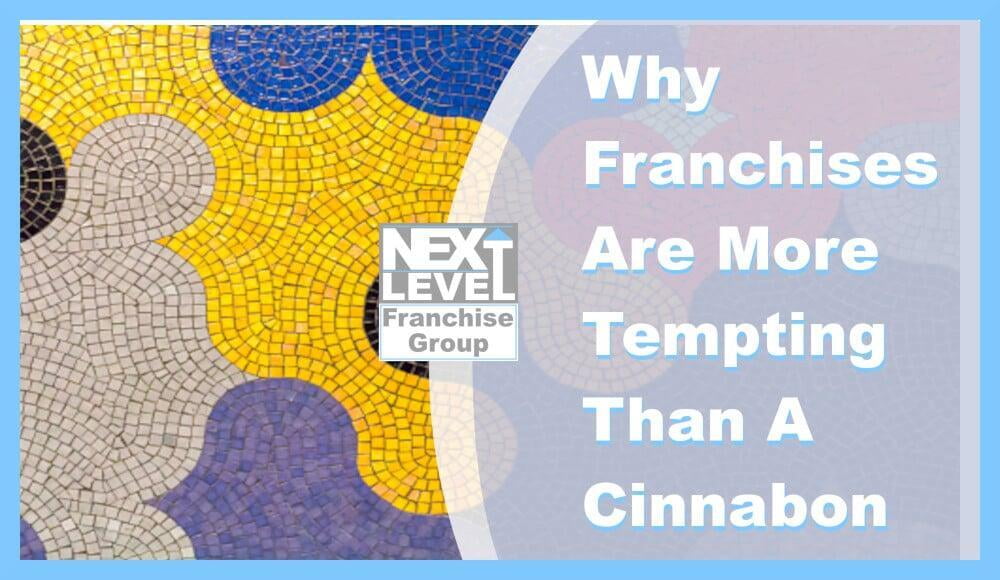
Stacey is on a mission to help people do what they love, love what they do, and she does that by helping people find a business that's a perfect fit for them. She truly doesn't want to set up somebody into a franchise that they don't really like. She wants to make sure that they're passionate about what they're going to do and enjoy it.
COVID, the Great Recession and Quiet Quitting … all of these words and more have forced people to really think about their lives and what's important to them. Most people are looking to get to the next level and want more passion in their work, more free time to spend with their friends and family, more flexibility to live life on their terms, and more opportunity to build on their wealth or not someone else's really.
The best and fastest way to achieve these goals is through business ownership, especially through franchise ownership. Look, no one wakes up today and says, "I'm going to buy a franchise today." But many people are very curious about franchises and that's why Stacey educates, motivates and inspires the dreams of business ownership through franchising. She even owns one today of her own, which is fantastic, in which for the past 16 years in which she's been the number one franchisee since day one. Isn't that amazing? How did you do that from day one? Girl, that's amazing.
Think of Stacey as a realtor for franchises. She's a realtor that helps you find the right franchise like a realtor helps you find that dream home, but Stacey helps you find your dream business.
So I want to know more: tell me about franchising. What is franchising first of all for those who are not quite sure about it? There are so many myths and misconceptions about franchising. Most people think, oh, franchising, that's french fries and fast food (some of them are). Or they'll say “I don't want to own a franchise ... franchises cost so much money. Why do I want to own a franchise? Then I'm locked into somebody else's system and on and on and on." Let's set the record straight, it's just not true. I mean, here's a pop quiz for your audience today. Do you know how many different franchise concepts there are out there in the United States? Let's say you're interested in looking at them and exploring franchises, how many different franchise concepts are there? Meaning more than industries, but franchises themselves. If you wanted to look at a franchise, how many different ones are there? There are more than 4,000 franchises.
Even if people want to look at a franchise there are various reasons people are curious about it and they may go out on Google and do some internet research, but many of them are stuck in their own misconceptions. Many just don't know what you don't know. So you may think that you want to own a certain kind of business and that may actually be the absolutely wrong route to go because a lot of people will explore something that might be their hobby, but maybe you should never do that because then you'll end up hating that hobby.
So what's really more important is to match your skills and your interests and your resources and your passion to a business where you would be a great fit and you could be successful doing it. Most times people have no idea that with so many different types of franchise concepts out there they would truly be a good fit. When I place my candidates, they're always amazed at what they end up being a match to, but ultimately they're thrilled at the end of the road, pun intended, in that they end up in a franchise that they love and therefore they end up being so much more successful in it.
One question I often get is “what is the biggest mistake that people make in owning a franchise”? To start with there are a lot of mistakes people make. The biggest is probably doing the research on their own because in most cases they don't even know what questions to ask. I will say that unfortunately there's just so much misinformation out there on the web, and when you go out and you start researching, you just don't know what you don't know. What often happens is you end up on some of these portals and you'll think you might be on an actual franchise website. So you go ahead and you put in your information and then all of a sudden you're being spammed and called and emailed and texted from all these different sources and your information's being sold to third parties because you didn't know that you really weren't talking directly to the franchise (we refer to this as being sharked).
Even if you do end up directly in correspondence with the franchise, you are not well educated enough to know what questions to ask or how to properly do the due diligence. Do you know what an FDD is? Do you know how to read it? The FDD by the way is the Franchise Disclosure Document. Do you know how to navigate the process and really make an informed decision, not an emotional decision (biggest mistake)?
That's why working with someone like me is so valuable because I'm playing the role of coach, mentor, and guide. Think of going on a road trip to somewhere that you've never been before. Well, if I'm giving you the keys to take that journey, what's the first thing you need to do? You need to know the end. You need to know where you're going. Wouldn't it be great to have a coach, a guide and a mentor there along with you on the way so that if you want to pull off or take an exit and explore and make sure you're not hitting the bumps in the road, that somebody's there to make sure you don’t get way lost or off the tracks? Well, that's what I do for my candidates. I help them learn about and explore franchising because the reality is it's not for everybody. If it's not for you, I'm going to share that with you also.
So you now ask what is it that would let somebody know that it's not for them? What are some of the things that you would know when talking to somebody and you'd say they're not going to enjoy this?

It's really going to depend on the person. Now sometimes there may be some transferable skills that just don't fit well into a franchise kind of culture. So for example, if you're the kind of person who just likes to sit behind your desk, do your nine-to-five, and don't want to talk to anybody. It's really just going to be very difficult to find a franchise where you could be a really good fit. On the other hand, if you are super entrepreneurial and you just want to make all the rules and make all the decisions, and there's no way in heck that you're going to follow anybody's system, a franchise may not be a great option for you because in a franchise. The reality is you are paying for a proven system and you are required to follow it.
When you think about franchises, as you mentioned, we think about McDonald's, we think about Burger King, those types of things. What are some other franchise industries that would be really important to know about?
There are more than 90 different categories that franchises represent. Some of my favorites that do so well are things like automotive, childcare, pet care, seniors services, and especially the home services industry, which is the plethora of everything from painting to gutters, to roofing to restoration. If you can think of a business, there is a franchise for it.
Here's another misconception, many believe all franchises are all just brick and mortar. Not today. So when you're looking at franchises there are 3 kinds of models that you could explore.
One is an owner-operator and this is a type of franchise where you're going to work in the business and then build it up, grow it, and scale it. But you're really in there on the day-to-day timeframe.
Whereas in a semi-absentee model, you may decide to keep your day job, but build this business on the side, hire a manager to grow a team and then grow and scale your business.
Then there are many people today who are looking for passive income, especially those who are coming into retirement. They know that they're just not quite ready to sit on the couch and eat potato chips. They're looking for something where they can bring in some additional revenue. But it's really to them more about lifestyle. They want to have fun, they want to have flexibility, and they want to have freedom. Actually, a franchise business can give you that. There are so many franchises today that can give you a lifestyle business that can provide significant passive income. And if it's of interest to you, then can also create a legacy where it's passed on to your family.
How much does it cost to get into a franchise? First, we say it doesn’t cost anything, acquiring a franchise is an investment. Here's the thing, there are franchises on every type of investment level, but what I do encourage my candidates is to have a minimum of $50,000 in liquid cash in order to give serious consideration to investing in a franchise. Because you will most likely pay a franchise fee, and in any business, you're going to need some money to start. It's not like on day one the cash flows coming in, you're going to need some time/funds to ramp up, do your marketing, and generate those customers and clients to get the cash flow really going.
Remember this, the last thing that a franchise wants you to do is to fail. So imagine having a whole team that's supporting you because they actually want you to be successful. Part of what they're going to be looking at is to make sure you have the necessary investment capacity because they don't want you to fail. That's bad for the brand, it's bad for the other franchisees.
So regardless of what a candidate has for investment purposes, it's not like they have to have all of that cash in the bank ready to go. We work with many different funding partners. It's amazing the resources that are out there today. You can take money from your 401K without any tax implications and use that to fund your business (and with no penalties). Some people they take money out of their home equity (HELOC). Some people get SBA funding, and some people go with unsecured funding and just build business credit to get going. So there are many different options and every franchise will have a different level of investment. So you don't necessarily have to have all of the money in the bank, but they should have some money in the bank (working capital). Because a franchise wants to make sure that you're going to be able to eat and pay your bills and be able to live while you're ramping up that business.

So this idea of passive income from a franchise isn't necessarily a fact, right?
Passive income is the idea that you don't have to be there day-to-day ringing the cash register in order to bring the money in. So there are many businesses that are lifestyle businesses, for example, a pest control business that goes out and sprays for mosquitoes and ticks and all the bugs so that people can go outdoors and enjoy that space. It can be passive income because it's recurring revenue. It's not like a one-time transaction and then you have to go out and find another customer or client or patient. The idea is that it's recurring because you're coming back every three weeks or so, and customers are with you for an extended period of time (as long as you are doing a good job), and therefore you have this passive income that's coming in because it doesn’t require you to find a new customer all the time to generate revenue. It’s passive.
You build it well enough that you hire a manager who takes care of the daily activities and then you can step aside, they're taking care of the operations, you get to go on vacations and then they can take care of the daily stuff going on. As I suggested, there are so many different options for passive income with franchises.
Likely on another note, many people reading or listening to this podcast are likely saying why would I even want to look at a franchise, I already have a business. It’s interesting that so many of the candidates I work with, they're small business owners already, and they're actually looking for something that can snap onto their existing business. Sometimes it's because they have a seasonal business and they're looking to bring in cash flow during the slower kinds of months. It's a situation where they're actually strategically using it to grow and expand the business.
For example, I have a candidate who's working with me right now. They're two partners and they own a mortgage broker business. So they've been doing mortgages. Well, we all know what's happening in the real estate market these days and they're looking for a business that they can snap onto what they're already doing. So we're going through my process together and what makes sense for them actually is an insurance franchise because they already have the customer base and therefore imagine being able to sell something to the customers that you already have by just snapping on another business. That makes sense, right? So thinking broadly, it's not always like everyone has to go do something completely different. Everybody's going to be in a different situation and kind of looking at franchise ownership for their own unique reasons.
So let's say I have my own consulting company, but I also am a Legal Shield representative. What this does is it gives me the opportunity to offer them legal services that they need that fit really nicely with my consulting business. Is that what you're suggesting? There's a whole synergy there.
What is it that we do to specifically help our clients?
We have a proprietary system, a nine-step system called the Franchise Roadmap, where I guide my candidates through a process that will strategically match their skills, their interests, their resources, and their passion for franchises. That would be a great fit now, including existing business owners who are looking for a new business opportunity to snap on to their existing business such as in the examples above.
The best thing about it is that there's never any cost to work with us. So our candidates will always say, this sounds amazing, but how much does it cost to work with you? My favorite answer which is zip, zero, nada, not even a penny. Here's why … we want to be objective in serving you. We want you to find the best choice. And when we do the franchise actually pays my fee (like a real estate seller pays a realtor when you bring them a purchaser). So there is never any cost to work with us, and therefore it keeps us both objective and allows me to find franchise matches that are a great fit for our clients.
To book your NO COST Dream Business Matchmaking Session with us go to Explore.NextLevelFranchiseGroup.com
How Can You Reach Laura Wagenknecht
The Mosaic Life with Laura Wagenknecht
What's Your Next? - Podcast
 | Author BioI’m Stacey Riska aka “Small Business Stacey”, your franchise placement specialist. I help aspiring business owners find the PERFECT franchise so they can get to the next level in life and business. |

